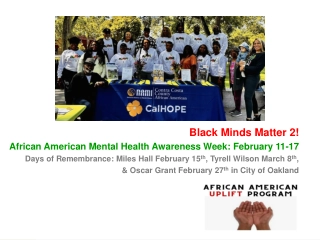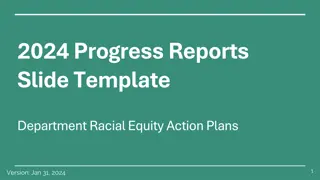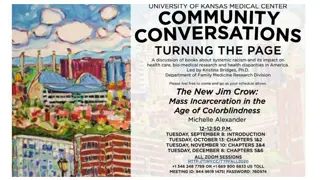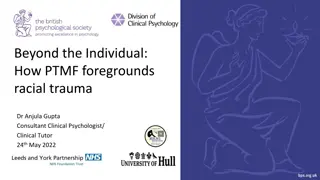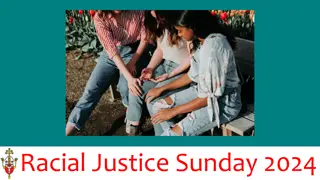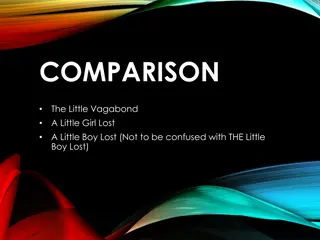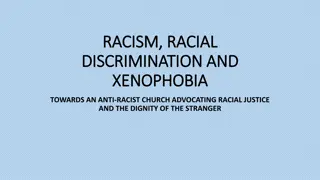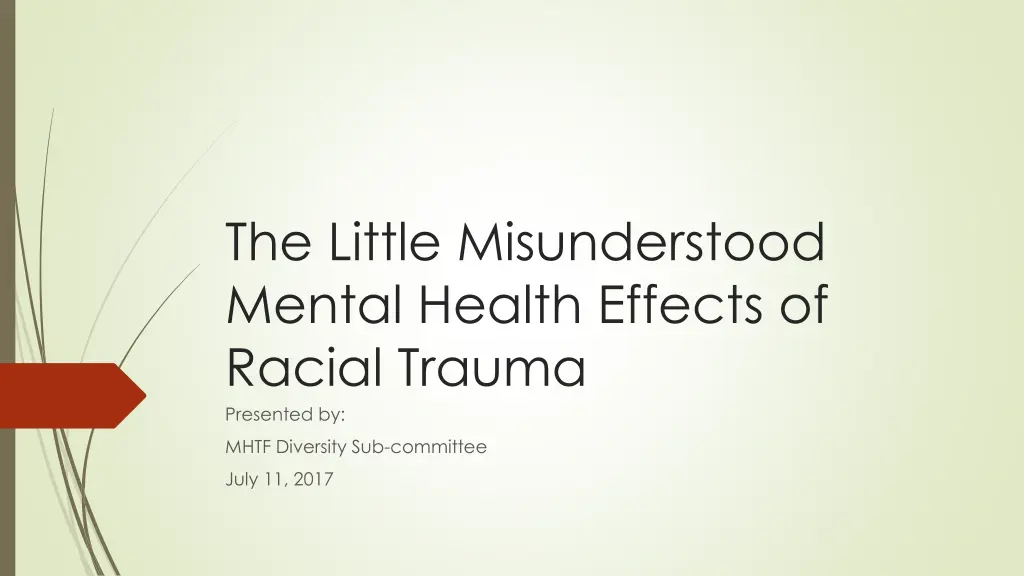
Understanding the Mental Health Effects of Racial Trauma
Explore the impact of racial trauma on mental health, including symptoms and coping mechanisms. Learn about racial harassment, witnessing racial violence, and experiencing institutional racism, and how these factors can lead to anxiety, depression, and other psychological effects.
Download Presentation

Please find below an Image/Link to download the presentation.
The content on the website is provided AS IS for your information and personal use only. It may not be sold, licensed, or shared on other websites without obtaining consent from the author. If you encounter any issues during the download, it is possible that the publisher has removed the file from their server.
You are allowed to download the files provided on this website for personal or commercial use, subject to the condition that they are used lawfully. All files are the property of their respective owners.
The content on the website is provided AS IS for your information and personal use only. It may not be sold, licensed, or shared on other websites without obtaining consent from the author.
E N D
Presentation Transcript
The Little Misunderstood Mental Health Effects of Racial Trauma Presented by: MHTF Diversity Sub-committee July 11, 2017
Introduction to Racial Trauma On Sunday, police officers in Seattle shot and killed Charleena Lyles in her home. She died in front of several children , according to reports and her family members say she was pregnant. Just days before Jeronimo Yanez, the Minnesota police officer who shot and killed Philando Castille during a traffic stop was acquitted of all charges. Earlier this spring, an unarmed teenager named Jordan Edwards was shot and killed by police as he was driving away from a party. By now, it s become a sickeningly familiar sequence of events. While the trigger (both literally and metaphorically) is the same, there is an aspect of these events that is frequently overlooked: the effects of the frequent police killings on black Americans mental health in the form of racial trauma, a psychological phenomenon that some experts say is similar to post-traumatic stress disorder (PTSD).
What is Racial Trauma? Racial trauma is mental health symptoms of individuals who have encounters with law enforcement, those who witness these events directly or indirectly may also be impacted negatively. In an attempt to capture how racism and discrimination negatively impacts the physical and mental health of people of color, many scholars have coined the term racial trauma or race-based traumatic stress. Racial trauma may result from racial harassment, witnessing racial violence, or experiencing institutional racism(Bryant-Davis, & Ocampo, 2006; Comas-D az, 2016). Racial trauma psychological symptoms such as anxiety, depression, hypervigilance to threat, low self-esteem, feelings of humiliation, poor concentration, irritability, or lack of hopefulness for your future as a result of repeated exposure to racism or discrimination Erlanger A. Turner, PhD
Symptoms of Racial Trauma Carlson 1997 Mode Re-experiencing Avoidance Cognitive Intrusive Thoughts Intrusive Images Amnesia of Trauma Derealization/Depersonalization Carlson (1997) also points to secondary responses to trauma. Secondary and Associated Affective Anxiety Anger Emotional Numbing Isolation Affect Behavioral Increased Activity Aggression Avoidance of Trauma Related Situations Responses: Depression Aggression Low Self-Esteem Identity Crisis Problems with Interpersonal Relationships Guilt and Shame Physiological Physiological Reactivity to Trauma Reminders Sensory Numbing Multiple Modes Flashbacks Nightmares Complex Activities in Dissociated States
Avoidance: Avoidance is a defense that assists an individual to minimize feelings that cause discomfort and trigger negative modalities. Identity: Trauma victims are known to adopt the identity of the victimizer. For example, victims of molestation have been known to develop into perpetrators themselves. Male children that witnessed domestic abuse are at a high risk in becoming abusers. This behavior has been observed in-present day Black police officers, bank officials, administrators, etc. Black people have been taught to hate themselves and anything associated. This is why it is easy for a Black person to kill someone that looks like him or her Interpersonal Relationships: Interpersonal relationships are impaired through identity issues and self-hatred. It is difficult for an individual to love someone if he or she doesn t know how to love him or herself. Many argue that the separation of the family was continued through the welfare system and mass incarceration.
Emotional Numbing: The Black male slave was forced to watch his offspring brutalized, disrespected, and sold. Black male slaves were used for breeding purposes and were not allowed to form an attachment to their offspring when they did, it was usually short lived. Today, it is well known that Black males still have difficulty emotionally connecting to their children and to Black women. Isolation of Affect: Negro clinicians are taught that showing affection is going against the grain of the European style of psychiatric discipline. As a result these clinicians have a reputation of not having the ability to relate to their clients, they are in fear that they may not meet their bosses approval with diagnoses. Anger: Black People have demonstrated their anger more commonly by reacting to difficult incidents with acts of violence or destruction rather than legal action. Normally, when a mass demonstration of anger is triggered by an event it unleashes accumulated aggression.
The 1999, Department of Education Federal Register defines the context of the term: "Emotionally Disturbed" in the following manner: An inability to learn that cannot be explained by intellectual, sensory, or health factors. An inability to build or maintain satisfactory interpersonal relationships with peers and teachers. Inappropriate types of behavior or feelings under normal circumstances. A general pervasive mood of unhappiness or depression. A tendency to develop physical symptoms or fears associated with personal or school problems. The term includes schizophrenia. The term does not apply to children, who are socially maladjusted, unless it is determined that they have an emotional disturbance.
Encompasses behavior, such as yelling or physical violence, that comes about as a result of feelings of anger. When you are angry, you will often take your anger out on the person causing it. But sometimes you are not able to express your anger directly AGGRESSION to the person who is causing it. And if you are unable to resolve your anger, it may become displaced, meaning that it is directed towards something or someone else that has nothing to do with the original conflict. Is aggressive behavior that cannot be expressed to the actual source that provoked the behavior; instead the anger is taken out on the easiest victim. In the example of Tom, he cannot take his aggression to DISPLACED AGGRESSION the source of his anger, his supervisor, due to the possibility of getting fired if he does. Instead, he takes out his anger and dissatisfaction with the way things are going at work, on the easiest victims, his wife and kids. After all, his wife and kids usually forgive him.
Coping with Racial trauma 1. Affirmation and acknowledgement 2. Create space for race 3. Racial storytelling 4. Validation 5. The process of naming 6. Externalize devaluation 7. Rechanneling Rage
References Meadows-Fernandez, R. (2017). The Little Misunderstood Mental-Health Effects of Racial Trauma. Science of Us, 1-3. Mims, S., Higgenbottom, L., & Reid, O. (n.d.). Post Traumatic Slave Disorder. Pyramid Builders, Inc., 1-90. Turner, E. A., & Richardson, J. (2016, July 14). Racial Trauma is Real: The Impact of Police Shootings on African Americans. Retrieved from American Psychological Association: Psychology Benefits: https://psychologybenefits.org/2016/07/14/racial-trauma-police-shootings-on- african-americans/

